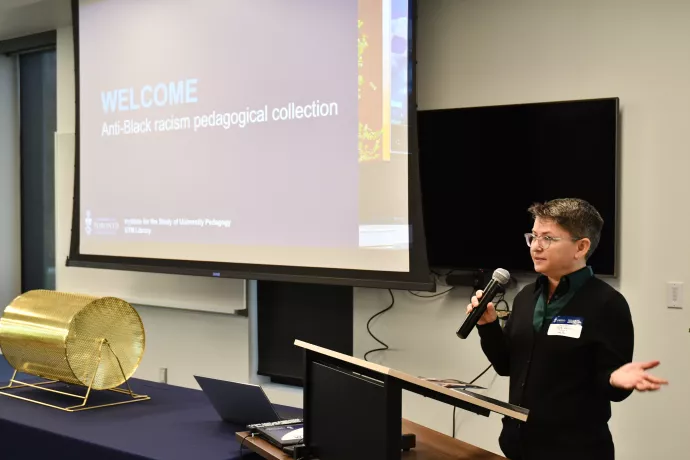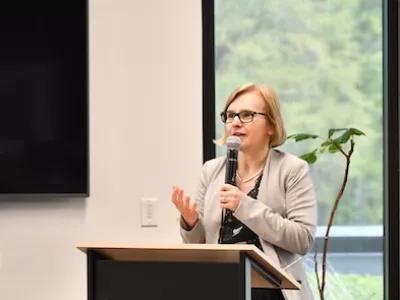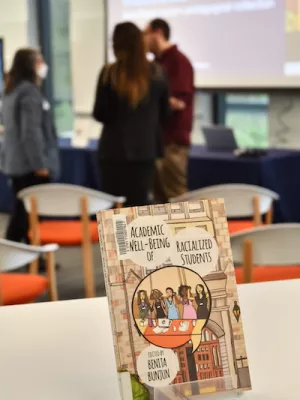
The launch of a most progressive pedagogical collection
The UTM Library and the Institute for the Study of University Pedagogy partner up to create a guide of resources that challenges anti-Black racism
A collaboration between the Institute for the Study of University Pedagogy (ISUP) and the UTM Library is the future: both in rethinking how institutions can implement social justice pursuits and related scholarly supports, and as a model for how departments can bolster their efforts in this area by joining forces.
During a gathering held on May 8th, the two departments launched the Anti-Black Racism Pedagogical Collection, which contains a curated list of resources related to challenging anti-Black racism in the classroom and exploring strategies that foster supportive and safe educational spaces.

library & learning services, UTM Library
“The guide that we are introducing today is one of the many steps we are taking to demonstrate our commitment to collection development that is decolonializing and Indigenizing, as well as trying to look at a variety of pedagogical approaches to make it easier for faculty to teach in an integral and authentic way, truly embracing inclusivity,” says Joanna Szurmak, interim associate librarian, library & learning services. Szurmak also described a variety of initiatives that UTM librarians are either leading or significant contributors towards, from serving on equity, diversity, and inclusion (EDI) committees to co-coordinating the Black History Month Wikipedia Edit-A-Thon across U of T’s three campuses and partners at York University, Toronto Metropolitan University, and the Toronto Public Library.
“We are targeting this at every level because we want to make this a real journey, truly reflecting the lived experiences of staff, students, and faculty, and the truths about the world. We can’t get at the truth unless we get the right materials and the right discovery pathways to make those materials available and accessible,” says Szurmak.
While the Library started out by focusing on the Departments of Anthropology and Sociology, Szurmak says they are currently broadening beyond those fields and offering pedagogical resources that encompass a range of disciplines and in various contexts.
Their efforts include themed book displays that often relate to inclusion, such as the current display for Asian Heritage Month. These collections are prominently displayed near the Library entrance, but over the last year, staff and librarians have worked to ensure these curated resource lists are also available throughout the year on their website—so next month’s Pride display will be accessible beyond the commemorative month of June.
As the event got underway, librarian Rob Makinson, interim head, public services and outreach, live launched the Anti-Black Racism Pedagogical Collection site to a round of applause, officially making it public so anyone can access it.
As the liaison librarian to ISUP, Makinson spoke about the guide in greater detail, providing a tour of the site and emphasizing the importance of having online spaces to showcase Library collections numbering in the millions. He also outlined the richness that comes from collaborations like this new guide: he coordinated the project with Corrine Bent-Womack, educational developer, anti-racist pedagogies at ISUP, who wrote many of the annotations with the support of graduate assistant Amina Warsame, along with ISUP’s EDI committee and members of the Anti-Black Racism Working Group.
“We do not perform our collection development in a vacuum, but rather base it on the relationships that we build with various departments,” said Makinson.
“Projects like this, where I can work with Corrine, Amina, and the rest of the EDI committee at ISUP, give us all the information we need, not only to surface the collections that need to be surfaced, but also to appropriately inform the acquisition of new material.”

The Anti-Black Racism Pedagogical Collection will be updated twice annually to ensure the latest research is included and to support UTM instructors in making learning for all students more equitable. Makinson shared that the guides are integrated with the hundreds of other guides created by U of T librarians and, along with adding new material on a regular basis, they may occasionally ‘weed out’ or remove titles if they are not serving the needs of the community or become outdated.
ISUP’s EDI committee has active working groups, one of which focuses on Anti-Black Racism. That group, led by Corrine Bent-Womack, Professors Janine Rose and Wanja Gitari, has been working on several initiatives this year, including this collaboration with the Library, as well as a collaborative learning community that will encourage faculty and staff to implement anti-racist practices in their work at UTM. The learning community initiative was launched in April 2023.
“ISUP has highly skilled staff, including our educational developers that have specific expertise in anti-racist pedagogy, accessibility, and other areas of pedagogy, who deliver support, programming, and resources to improve university pedagogy at UTM,” says Ruth Childs, director of ISUP.
“In addition to the educational developers and other staff who support instructors’ teaching and students’ learning through the Robert Gillespie Academic Skills Centre, we also have a growing group of faculty with expertise in university pedagogy, who are teaching foundational and interdisciplinary courses. This year we taught half of the UTM’s incoming students, and within the next couple of years, we will teach every incoming student at UTM.”
Resources
- Visit the UTM Library for the Anti-Black Racism Pedagogical Collection.
- For questions and recommendations about the guide, contact Corrine Bent-Womack or Rob Makinson.
- See all 263 research guides published by the UTM Library
- Find out more about the Institute for the Study of University Pedagogy.
